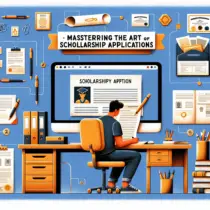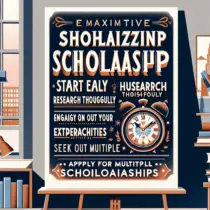Mastering the Art of Scholarship Applications
Applying for scholarships can be a daunting task, but it is a crucial step for many students in securing their education without a heavy financial burden. Mastering the art of scholarship applications requires careful planning, attention to detail, and a good understanding of what scholarship committees are looking for. This guide will help students enhance their application skills and increase their chances of winning valuable scholarships, such as "The Law Students Scholarship value of €400, Germany" and the "£15,609 Wales ESRC Doctoral Training Association Scholarship in Computer Science in UK, 2022."
Understanding the Scholarship Landscape
The first step in mastering scholarship applications is to recognize the diverse landscape of available scholarships. Scholarships come in many shapes and sizes, tailored to different fields of study, student demographics, and levels of academic achievement. Knowing where to look is critical. Websites like Scholarships.com, Fastweb, and the official websites of educational institutions are great places to start.
It is essential to identify scholarships that suit your specific needs and qualifications. For instance, "The Law Students Scholarship value of €400, Germany" would be targeted at law students, specifically in Germany, and could be ideal for someone pursuing a degree in legal studies. On the other hand, the "£15,609 Wales ESRC Doctoral Training Association Scholarship in Computer Science in UK, 2022" targets doctoral students in the field of computer science in the UK. By recognizing these distinctions, students can better allocate their efforts towards scholarships where they are more likely to succeed.
Preparing Early
Early preparation is a significant advantage in the scholarship application process. Scholarship deadlines can sneak up quickly, and last-minute efforts typically fall short. Begin by creating a timetable that outlines deadlines for each scholarship you aim to apply for, including time for revising and perfecting application components.
Gathering necessary documents in advance is also crucial. Most scholarships require transcripts, personal statements, recommendation letters, and sometimes, a portfolio of previous work. Having these documents ready can reduce stress and ensure that nothing is rushed or overlooked.
Crafting a Compelling Personal Statement
The personal statement is often the heart of a scholarship application. It is the applicant’s opportunity to showcase their personality, achievements, and aspirations. An effective personal statement should:
-
Be Personal and Honest: Scholarship committees often look for authenticity. Be genuine about your achievements and aspirations. Avoid exaggeration and present real experiences and goals.
-
Be Structured: Start with a strong introduction that grabs attention. Follow with body paragraphs that provide clear and detailed information about your background, motivation, and goals. Conclude with a compelling summary that leaves a lasting impression.
-
Be Relevant: Tailor your personal statement to each scholarship. Highlight experiences and aspirations relevant to the field of study and the scholarship’s objectives. For example, if applying for the "£15,609 Wales ESRC Doctoral Training Association Scholarship in Computer Science in UK, 2022," emphasize your background in computer science and future research goals.
-
Proofread: Grammatical errors and typos can be detrimental. Proofread your statement multiple times and, if possible, have someone else review it to catch errors you might have missed.
Securing Strong Letters of Recommendation
Letters of recommendation are an essential part of most scholarship applications. Choose recommenders who know you well and can provide specific examples of your achievements and abilities. Professors, employers, and mentors are typically good choices.
Ask your recommenders well in advance and provide them with all necessary information about the scholarship, including the criteria and any specific points you’d like them to emphasize. Follow up with a polite reminder a week before the submission deadline to ensure they haven’t forgotten.
Highlighting Your Achievements
A crucial part of any scholarship application is demonstrating your achievements and potential. This can include academic successes, extracurricular involvement, volunteer work, and professional experience. Make sure to:
-
Quantify Your Achievements: Use numbers to give context to your accomplishments. For example, rather than saying you increased membership in a club, state that "membership increased by 30% under my leadership."
-
Provide Evidence: Whenever possible, provide evidence of your achievements. This could include certificates, awards, or even publications.
-
Show Impact: Discuss the impact of your work. How did your actions benefit others or contribute to a larger goal? Scholarship committees are not just interested in what you did, but also in how it made a difference.
Customizing Each Application
One common mistake is to submit the same application for multiple scholarships. Each scholarship has unique criteria and objectives, and tailoring your application to meet these specifics can significantly improve your chances of success. For instance, "The Law Students Scholarship value of €400, Germany" might prioritize your commitment to legal studies and your plans to contribute to the field. Ensure your application clearly reflects these points.
Managing Deadlines and Submissions
Keeping track of deadlines is fundamental. Use a calendar or digital planner to keep all dates in one place and set reminders a week in advance for each deadline. Submitting applications well before the deadline can avoid any last-minute technical issues and demonstrate responsibility and planning skills to the scholarship committee.
Preparing for Interviews
Some scholarships require an interview as part of the application process. If selected for an interview, preparation is key:
-
Research: Know everything you can about the scholarship, the organization offering it, and its past recipients.
-
Practice: Conduct mock interviews with friends, family, or mentors. Prepare answers to common questions, such as why you deserve the scholarship and how you plan to use the funds.
-
Present Yourself Well: Dress professionally and ensure you are well-groomed. Being on time for the interview is a must.
-
Ask Questions: Prepare a few questions to ask the interviewers. This shows your interest in the scholarship and helps you gather more information.
Navigating the Online Application Process
Many scholarships now require online applications. Familiarize yourself with the online systems and understand the submission process. Save copies of all your submissions and make sure you receive confirmation emails. Sometimes files can be too large or in the wrong format, so test submissions early if possible.
Following Up
After submitting your application, a polite follow-up can show your continued interest. An email thanking the committee for considering your application and expressing your anticipation for their decision can leave a positive impression.
Handling Rejections Gracefully
Not all applications will be successful, and handling rejections gracefully is part of the learning process. Each rejection can provide insight into how to improve for the next opportunity. Seek feedback where possible, and don’t let rejections deter you from continuing to apply.
Learning from Successful Applications
Analyze successful applications to understand what worked. If you know peers who have won scholarships, ask to see their applications. Look for common elements and consider how you can incorporate similar strengths in your applications.
Utilizing University Resources
Many universities offer resources to help with scholarship applications. Career services, writing centers, and faculty advisers can provide valuable guidance and feedback. Don’t hesitate to utilize these resources.
Conclusion
Mastering the art of scholarship applications is a multifaceted process that involves thorough preparation, attention to detail, and perseverance. By understanding the scholarship landscape, preparing early, and crafting compelling applications tailored to each opportunity, students can significantly increase their chances of success. Scholarships like "The Law Students Scholarship value of €400, Germany" and the "£15,609 Wales ESRC Doctoral Training Association Scholarship in Computer Science in UK, 2022" are within reach for those willing to invest the necessary time and effort.
Applying these strategies thoughtfully and consistently will not only improve scholarship application outcomes but also build valuable skills that will be beneficial in future academic and professional endeavors.






